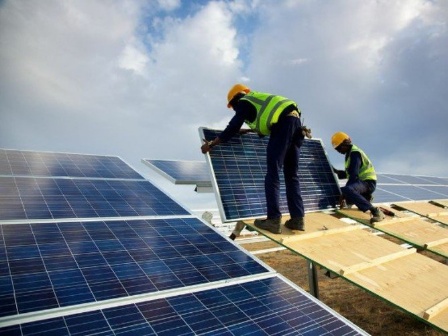Solar energy has gained remarkable traction in Nigeria, a country blessed with abundant sunlight throughout the year. As the nation continues to grapple with inadequate electricity supply from the national grid, more Nigerians are turning to solar energy as a reliable alternative. In this article, we will delve into the factors influencing the cost of solar energy installation in Nigeria in 2024, providing insights for homeowners, businesses, and policymakers looking to invest in sustainable energy solutions.
Why Solar Energy?
Solar energy offers a range of benefits, including:
- Energy Independence: Solar energy reduces reliance on the unstable national grid and costly fuel generators.
- Environmental Sustainability: It is a clean and renewable source of energy, reducing carbon emissions.
- Cost-Effectiveness in the Long Term: Though the initial cost of installation is high, solar energy systems offer significant savings over time.
- Scalability: Solar energy systems can be customized to suit the energy needs of homes, small businesses, and large enterprises.
Components of a Solar Energy System
The cost of solar energy installation depends largely on the components used. A typical solar energy system consists of:
- Solar Panels: These capture sunlight and convert it into electricity. Their efficiency, size, and brand affect the price.
- Inverters: These convert direct current (DC) from the panels into alternating current (AC) for use in appliances.
- Batteries: Essential for storing energy, especially in regions with irregular sunlight or during nighttime.
- Charge Controllers: These regulate the voltage and current from the solar panels to the batteries.
- Mounting Structures: Used to install solar panels securely on rooftops or ground setups.
- Cables and Accessories: Quality wiring and connectors ensure optimal system performance.
- Installation Costs: Includes labor and technical expertise required for system setup.
Factors Influencing the Cost of Solar Energy Installation
- System Size and Capacity The size of the system required depends on the energy needs of the user. For instance, a typical 3-bedroom home may need a 5 kW system, while a medium-sized business may require 10-15 kW. Larger systems naturally cost more.
- Quality of Components The brand and quality of components significantly impact costs. Premium brands like LG, Tesla, or SunPower are more expensive but offer higher efficiency and longer warranties compared to cheaper alternatives.
- Battery Storage Batteries constitute a significant portion of the total cost. Lithium-ion batteries, such as Tesla Powerwall, are more expensive than lead-acid batteries but offer better performance and durability.
- Labor Costs Skilled labor is required for proper installation. In Nigeria, labor costs vary depending on the region and complexity of the installation.
- Government Policies and Incentives Tax rebates, subsidies, or import duty waivers on solar components can reduce costs. The Nigerian government and international organizations are making efforts to promote renewable energy through such initiatives.
- Location Remote areas may incur higher installation costs due to transportation of materials and limited availability of skilled technicians.
Estimated Cost Breakdown in 2024
Here is an estimated breakdown of costs for solar energy installation in Nigeria in 2024:
- Small Home System (3-5 kW):
- Solar Panels: ₦1,500,000 – ₦2,000,000
- Inverter: ₦500,000 – ₦750,000
- Batteries: ₦1,000,000 – ₦1,500,000
- Charge Controller and Accessories: ₦200,000 – ₦300,000
- Installation: ₦200,000 – ₦400,000
- Total: ₦3,400,000 – ₦5,000,000
- Medium-Sized Business System (10-15 kW):
- Solar Panels: ₦3,000,000 – ₦4,500,000
- Inverter: ₦1,000,000 – ₦1,500,000
- Batteries: ₦2,500,000 – ₦3,500,000
- Charge Controller and Accessories: ₦500,000 – ₦750,000
- Installation: ₦500,000 – ₦800,000
- Total: ₦7,500,000 – ₦10,000,000
- Large Industrial System (20-50 kW):
- Solar Panels: ₦5,000,000 – ₦10,000,000
- Inverter: ₦2,000,000 – ₦3,000,000
- Batteries: ₦5,000,000 – ₦10,000,000
- Charge Controller and Accessories: ₦1,000,000 – ₦2,000,000
- Installation: ₦1,000,000 – ₦2,000,000
- Total: ₦14,000,000 – ₦27,000,000
Maintenance Costs
Solar energy systems are relatively low-maintenance. Routine inspections, cleaning of solar panels, and occasional battery replacements are the main expenses. Annually, maintenance costs range between ₦100,000 and ₦500,000 depending on system size.
Return on Investment (ROI)
Although the initial investment is significant, solar energy systems offer excellent ROI. Most installations pay for themselves within 4-7 years through energy savings and reduced reliance on fuel generators. Additionally, businesses may qualify for carbon credits and other incentives, further improving ROI.
Challenges and Solutions
- High Initial Cost
- Solution: Access financing options such as loans, payment plans, or leasing arrangements offered by banks and solar companies.
- Lack of Awareness
- Solution: Public awareness campaigns highlighting the benefits and long-term savings of solar energy.
- Substandard Components
- Solution: Purchase from reputable suppliers and insist on warranties for all components.
- Limited Technical Expertise
- Solution: Train more technicians through government and private sector initiatives.
Government and International Support
The Nigerian government has been working with international organizations to promote renewable energy adoption. Initiatives like the Rural Electrification Agency (REA) and World Bank’s solar projects aim to subsidize installations and provide technical support, making solar energy more accessible to Nigerians.
Conclusion
The cost of solar energy installation in Nigeria in 2024 remains significant but highly rewarding in the long run. With decreasing component prices, improved government support, and growing awareness, more Nigerians can transition to this sustainable energy source. Investing in solar energy is not just an economic decision; it is a step toward energy independence and environmental sustainability. For homeowners and businesses alike, solar energy is the future of electricity in Nigeria.



